(Updated at 4:45 p.m.) Local elected officials, including Rep. Gerry Connolly, gathered in Lorton on Wednesday to celebrate the introduction of 42 new electric buses to the division’s fleet.
These buses, which were funded by a $16.5 million federal grant announced in January, join the 18 electric buses already in operation. Although the division currently operates over 1,600 diesel buses, county officials emphasized that these new electric buses mark the start of a larger transition.
“I know that this downpayment is the beginning of something much larger, and that’s going to take many years for us to complete,” School Board Chair Karl Frisch told the crowd of attendees at Lorton Station Elementary School on Wednesday.
“But I’m confident with our continued activism by our students, their parents, our Moms Clean Air Force and our school board colleagues and our friends at the state and federal level that we can get there because we absolutely have to,” he continued.
FCPS has pledged to provide entirely carbon-neutral student transportation by 2035. So far, the division has reduced 38% of its greenhouse gas emissions from 2008, according to the 2022 FCPS Greenhouse Gas Inventory Report.
In January 2021, the division received its first electric school bus as part of a Dominion Energy-led initiative aiming to replace all diesel school buses in Virginia by 2030. However, the Virginia House of Delegates rejected the expansion of this program, opting instead to create a grant fund.
In March, VDOT announced it had allocated $11.3 million in federal funding to assist the statewide construction of electric vehicle charging stations.
FCPS received eight electric buses from Dominion in 2021 and secured a state grant for 10 additional buses through a settlement with Volkswagen, which had been sued for emissions test cheating in 2016.
The new federal grant funds come from the Bipartisan Infrastructure Law, signed by President Joe Biden in 2021. The grant, administered through the EPA’s Clean School Bus Program, allocates $5 billion to the Clean School Bus program which is dedicated to replacing existing school buses with zero-emission and low-emission models.
“Every day throughout the United States we’re transporting 10s of millions of students on buses, and many of those buses are anything but clean,” Connolly said during the event.
“Here in Fairfax we’ve got 1,600 school buses, and today’s a great down payment toward a movement for replacing every one of them and making sure our kids are safe and in a healthy environment but also in a vehicle that is not contributing to the environmental problem,” he added.
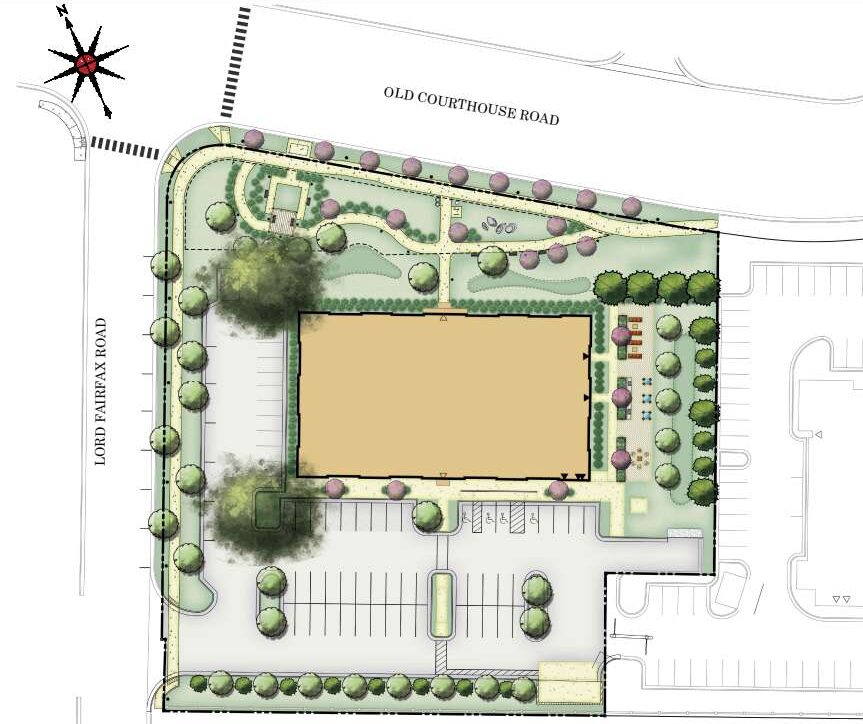
Another Tysons office building is set to be transformed into housing.
After a public hearing on Tuesday (March 19), the Fairfax County Board of Supervisors approved a proposal to convert the three-story office building at 8221 Old Courthouse Road into 55 multi-family apartments, including six workforce dwelling units.
About 70% of the apartments will have one bedroom, but some two-bedroom units will also be provided, according to Walsh Colucci Lubeley & Walsh land use attorney Robert Brant, who represented the property owner and developer, a Dittmar Company affiliate, at the hearing.
While the existing 45,000-square-foot building will stay intact, the development will bring pedestrian and streetscape improvements to Old Courthouse and Lord Fairfax roads, including new sidewalks, landscaping and crosswalks at the intersection.
The plan replaces about 90 parking spaces with open space, including a publicly accessible, 7,840-square-foot pocket park and a private, 8,400-square-foot outdoor space for residents. Amenities available to the public will include 6-foot-wide walkways, pergolas, benches and bicycle racks, while the private space will provide movable seating, tables, grill stations and stormwater facilities, such as a rain garden.
“We were very focused on the green space, and I believe the homeowners or renters would want that as well,” Providence District Supervisor Dalia Palchik said of the county’s negotiations with the developer.
However, the trade-off of parking spots for green space has left some area residents concerned that traffic for the new apartments will spill into their neighborhoods and disrupt travel to and from nearby Freedom Hill Elementary School.
Dittmar agreed to retain 66 spaces in the existing parking lot and add striping for eight spaces on Lord Fairfax Road, meeting the county’s minimum requirement.
One homeowner’s association sent a letter to the board on Feb. 21 worrying that the apartment residents will compete for parking currently used by parents when dropping off and picking up their kids, Board of Supervisors Chairman Jeff McKay said.
At the public hearing, one resident whose daughter walks to Freedom Hill said she’s concerned about increased traffic and safety at the Old Courthouse/Lord Fairfax intersection. Claudia Stein, who lives on Lord Fairfax Road across from the site, urged the developer to keep at least 30 more parking spaces.
“There is always more demand for parking than anticipated,” Stein said. “The apartment residents and guests will be forced to park on the street in the neighborhood, which will take away parking from existing residents.”
Residents have also been advocating for the county to close a gap in the sidewalk on the west side of Lord Fairfax Road, Stein said. As a temporary measure, the gap has been filled with gravel, but vehicles sometimes park on the gravel, forcing students and other pedestrians into the road.
After confirming the location of the sidewalk gap, supervisors said they can’t compel the developer to address it, since it’s not on their property. Providence District Supervisor Dalia Palchik confirmed that her office will work with Stein to see what can be done by the county.
“It just seems like a great opportunity for our [department of transportation] to work with the property owner to maybe make an improvement in the future,” McKay said.
In response to the concerns about traffic, Brant told the board that shifting the property from office to housing will reduce parking demand and vehicle trips, which are projected to drop by 75% during the morning rush hour and 77% in the evening rush hour.
For some supervisors, the big sticking point was the developer’s commitment to only meeting the county’s minimum — 2% of parking spaces — for electric vehicle charging stations. That amounts to just two of the 66 provided spaces.
“I literally got sent an article yesterday about how electric vehicles and gas-powered cars are starting to level out in cost,” Dranesville District Supervisor Jimmy Bierman said. “If you want this building to be good for residents 10 years down the line, you’re going to need more than 1.32 spaces, so please provide more.”
McKay suggested that the developer consider pre-wiring some spaces so they can support EV chargers “in the future if the demand is there.”
Dittmar is “willing” to look at providing more EV charging stations, Brant said.
“We’ve had discussions internally about how more and more electric vehicles are on the road these days,” Brant told the board. “More residents want that as an amenity, so there’s a chance that, once we get into the construction phase of this, there will be an opportunity to add more. So, that’s something the applicant will consider.”
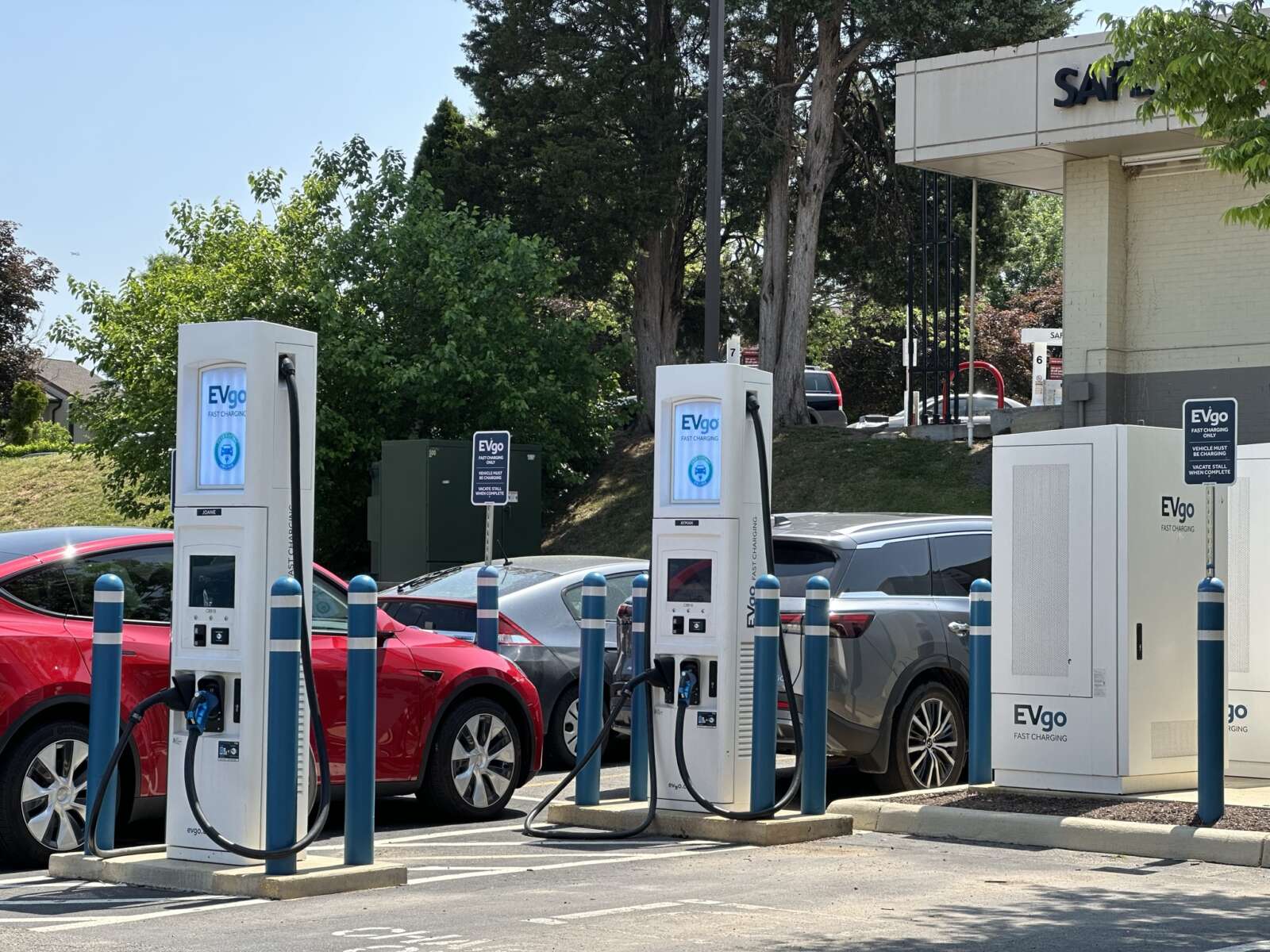
To further its environmental goals, Fairfax County’s to-do list should include building an electric vehicle charging network, addressing “critical” staff shortages, and addressing development pressure, the Environmental Quality Advisory Council (EQAC) says in a new report.
An employee compensation policy update to attract and retain workers in departments such as wastewater and solid waste was the top recommendation in the 2023 Annual Report on the Environment (ARE), EQAC Chair Larry Zaragoza told the Board of Supervisors during its environmental committee meeting on Tuesday (Feb. 29).
“If you had a problem in a facility or in operations that caused some other issues, the consequences could require a lot of corrective action, or they could be publicly undesirable,” he said.
Although it has seen some progress, Zaragoza said the Department of Public Works and Environmental Services (DPWES), in particular, is seeing higher vacancy rates of 16 to 22%. In some “major functions,” rates have climbed as high as 32%, according to the presentation.
Zaragoza acknowledged that the recommendation to develop a network of charging stations for electric vehicles would be challenging to implement, but necessary.
“This seems to be an issue that is challenging the nation with respect to the conversion to EVs,” Zaragoza said. “People have a fear that they won’t have options for charging their vehicles.”
Board of Supervisors Chairman Jeff McKay said that, while it’s true more EV charging stations are needed, the biggest issue is maintenance, speculating that, on a typical day, about 50% of chargers don’t seem to work.
He advised the council to look into ways to address the maintenance issues, including potential legislative measures.
“The EV charging people are racing to get as much federal money as they can to install these and then don’t have anybody to come back and repair them,” McKay said. “And to me, that’s a huge threat to EV utilization because [when] you see them on a map, you expect them to be working.”
Reiterating a recommendation made last year, the report calls for the county to provide more funding for its stormwater program through either one of two options:
- An increase in the Stormwater Service District tax in 2024 by at least one-quarter penny, from 3.25 cents to 3.5 cents per $100 of assessed real estate value
- A change in the base property tax rate
Mason District Supervisor Andres Jimenez asked the council to keep equity and low-income residents in mind when considering these adjustments.
“I would hope that there will be something in place to ensure that the cost increases are equitable and do not disproportionately affect low-income residents,” Jimenez said.
The report also highlights a need to address pressure from development while preserving trees and minimizing ecological degradation.
“As you have development, you often have the loss of trees, you often have loss of habitat, and to the extent that it’s possible, it’s good to try to preserve as much as you can in this process,” Zaragoza said.
McKay agreed with the need to minimize environmental damage but said the council should also carefully consider how that priority intersects with the “oldest parts of the county that are in desperate need of revitalization.”
According to the report, proposed topics that the EQAC will review this year include the impacts of data centers, flood risks, and water security.
County staff have been developing guidelines for regulating noise, water pollution, power usage and other issues raised by data centers. In a new ARE recommendation, EQAC suggests that the county collect energy consumption data on its current and planned data centers, including the extent to which they utilize green energy.
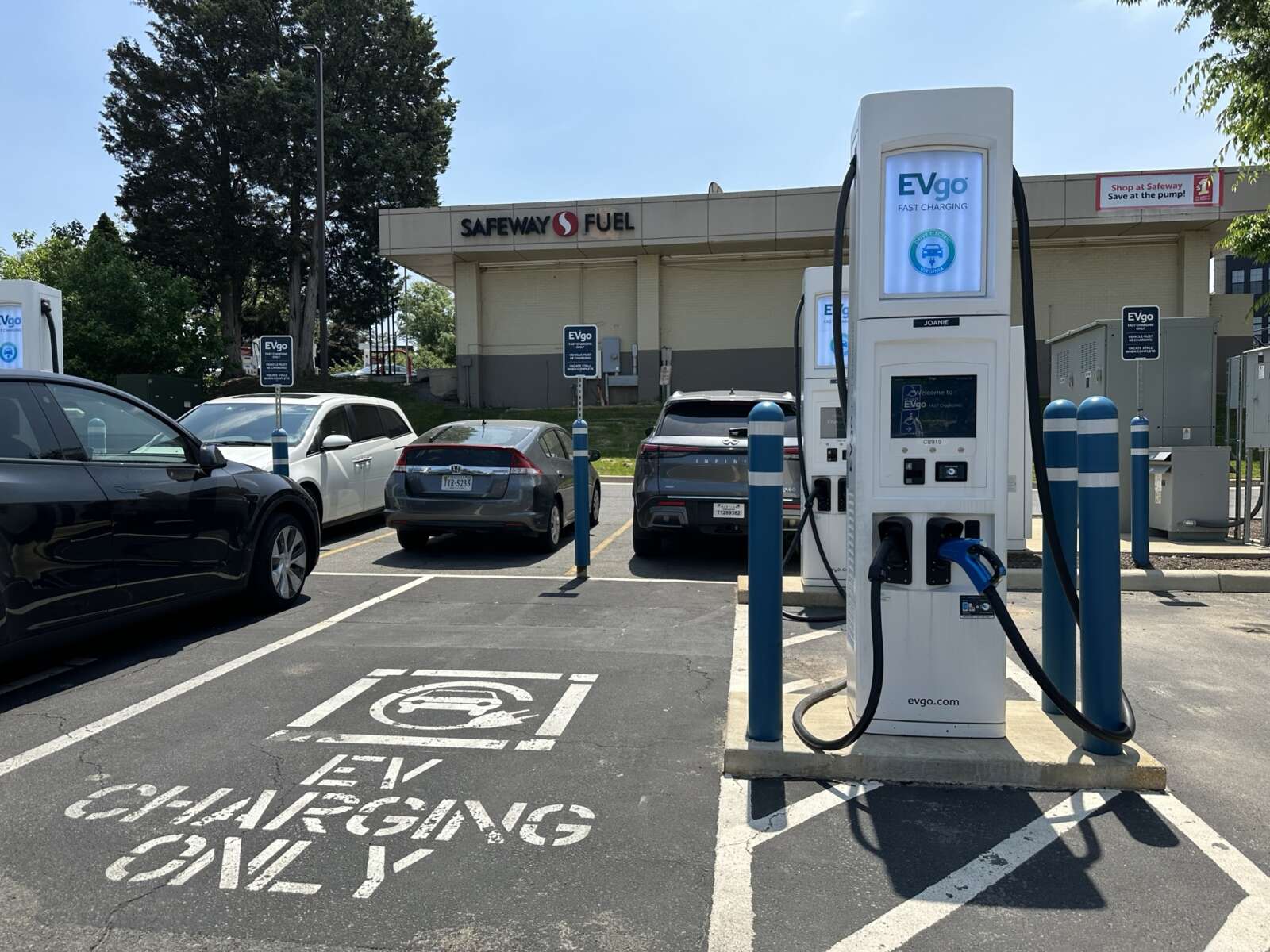
Fairfax County may continue waiving permitting and installation fees for electric vehicle chargers, following an initial trial period of 18 months that showed mixed results.
At a land use policy committee meeting on Tuesday (Jan. 30), Fairfax County Board of Supervisors Chairman Jeff McKay said he hopes to extend the trial period by one year.
Despite losing revenue from the waived fees, the county should find ways to reduce barriers for EVs, particularly since there are already many existing barriers, McKay argued.
“From a value statement standpoint, being able to say that we do not charge [for] permits to encourage people to adopt EVs, I think, should be our standard,” he said.
It was unclear how much eliminating the fees incentivized installation of EV charging equipment — if at all, county staff said in a presentation. Between October 2022 and October 2023, fees for 38 commercial permits and 858 residential permits were waived.
The Dranesville and Sully districts had the most residential permits issued, while the Providence District led the way when it came to commercial permits. The 38 commercial permits issued during the waiver period represented an increase from 19 permits in 2021, 11 in 2020 and just one in 2019.
The data doesn’t include the number of chargers installed through each permit.
John Friedman, an engineer in the county’s Department of Land Development Services (LDS), said it’s difficult to directly correlate the fee waiver with EV utilization.
“We had hoped to be able to collect enough information to determine whether or not having a zero permit fee actually incentivizes installation. We weren’t able to do that because you don’t actually know why people are doing things,” Friedman said, adding that staff were surprised by the relatively high number of residential permits.
The county missed out on $125,000 in revenue over the trial period — a loss that Friedman was concerned likely needs to be offset by increases in other LDS fees.
“The big issue for us is the lost revenue,” Friedman said.
Braddock District Supervisor James Walkinshaw said the societal benefits of EV further the county’s equity goals.
“Everybody benefits if even an affluent person decides to move forward with an EV,” Walkinshaw said.
McKay hopes to file a board matter for consideration at the board’s May meeting, giving county staff time to continue evaluating the impact of the fee waiver on utilization. The current fee waiver pilot program will end on May 1.
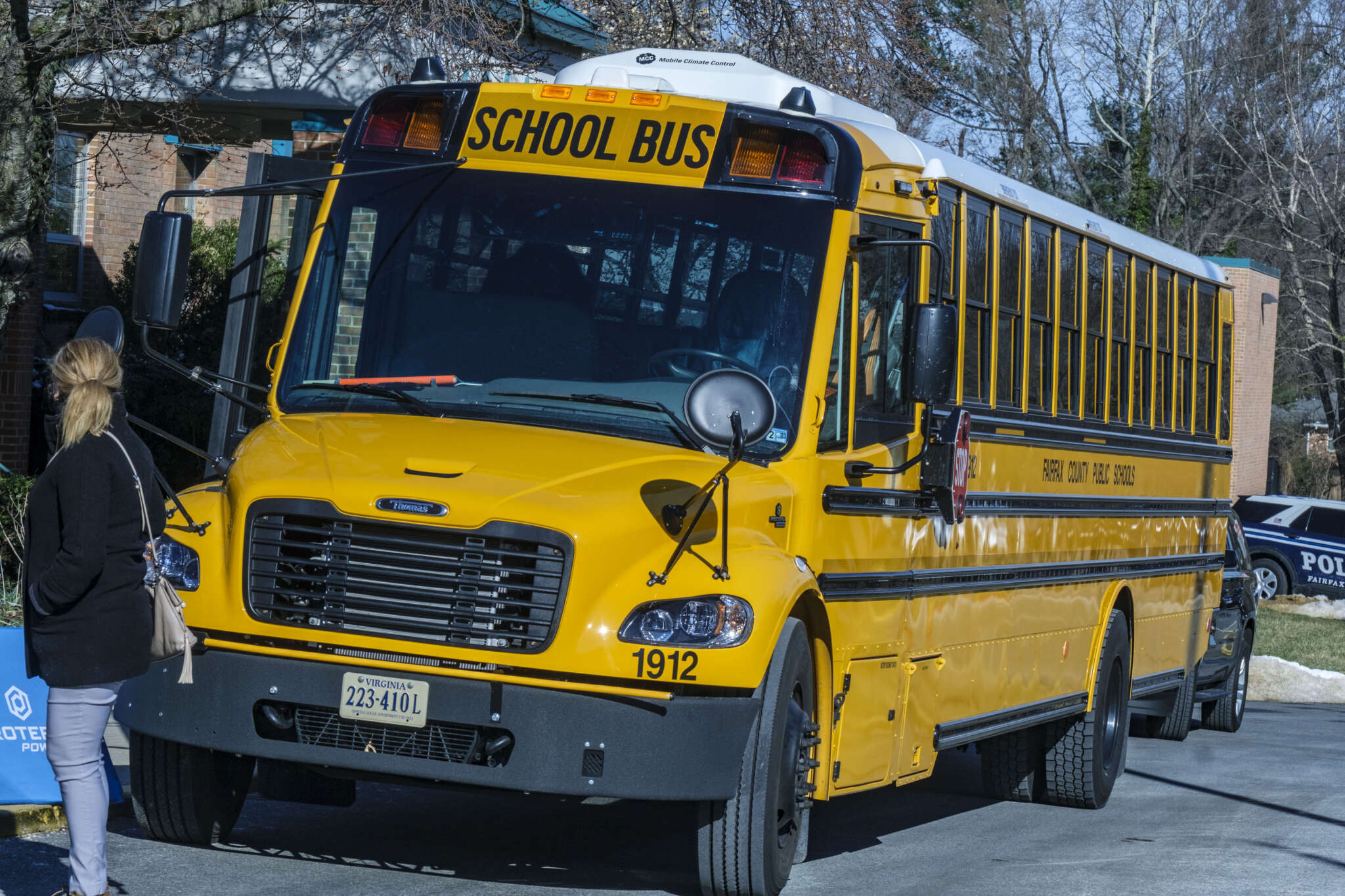
Fairfax County Public Schools will more than double the number of electric buses in its fleet, thanks to a new federal grant.
The local school system has been awarded $16.59 million as a winner of the U.S. Environmental Protection Agency’s inaugural Clean School Bus program grants competition. The other winner announced yesterday (Monday) was also from Virginia: Newport News Public Schools will receive $525,000.
The funds will enable FCPS to purchase 42 electric school buses. According to its website, the district currently has eight electric buses in a fleet with 1,625 buses, but it was slated to add another 10 in 2022. FCPS didn’t respond by press time when asked to confirm whether those buses are now operating.
“We are honored and excited to be among the recipients of the Environmental Protection Agency’s Clean School Bus Awards,” FCPS Superintendent Dr. Michelle Reid said in a statement. “This recognition not only underscores our commitment to sustainability and environmental stewardship but also reflects our ongoing efforts to provide healthier, cleaner transportation for all Fairfax County Public Schools students.”
FCPS has pledged to provide entirely carbon-neutral student transportation by 2035. The first electric school bus arrived in January 2021 as part of a statewide initiative led by Dominion Energy, which had proposed replacing all diesel school buses in Virginia by 2030.
However, the Virginia House of Delegates voted against expanding Dominion Energy’s program that spring, instead creating a grant fund that never got funding.
After getting eight electric buses from Dominion in 2021, FCPS received a state grant for 10 buses out of a settlement agreement with Volkswagen, which had been sued in 2016 for cheating on vehicle emissions tests.
The new federal grant funds come from the Bipartisan Infrastructure Law signed by President Joe Biden in 2021, allocating $5 billion to create the Clean School Bus program, which is dedicated to replacing existing school buses with “zero-emission and low-emission models.”
While FCPS intends to buy electric buses, Newport News requested funding to add propane-fueled buses, a switch it said will reduce emissions and lower fuel and maintenance costs.
Rep. Gerry Connolly called the grant “a game-changer” for FCPS.
“The environmental benefits of these new buses are vitally important to our fight against climate change, but the good news doesn’t stop there,” Connolly said. “Students, staff, and parents who spend time on and around school buses will no longer be exposed to diesel exhaust and other toxins from diesel-powered buses.”
This is a gamechanger for Fairfax County. Clean school buses will bolster our fight against climate change and protect the health of students, staff, and parents.⁰
This win comes thanks to the #BipartisanInfrastructureLaw signed by President Biden.⁰https://t.co/mcAKAvZZoH https://t.co/an33Aarx5K— Rep. Gerry Connolly (@GerryConnolly) January 8, 2024
Outside of the school system, the Fairfax County government adopted an operational energy strategy in 2021 whose targets included converting all of its buses and fleet vehicles to electricity or another non-carbon-emitting fuel by 2035.
Fairfax Connector, the county’s public bus system, welcomed its first electric buses in September, and the Department of Public Works and Environmental Services added an electric trash truck in August.
Late last year, the county launched a Climate Action Dashboard to keep track of its progress on various efforts to combat climate change. The transportation portion of the dashboard indicates that the county government has acquired 224 hybrid and 50 fully electric vehicles, putting it just 1.5% of the way to its goal of completely transitioning in just over a decade.
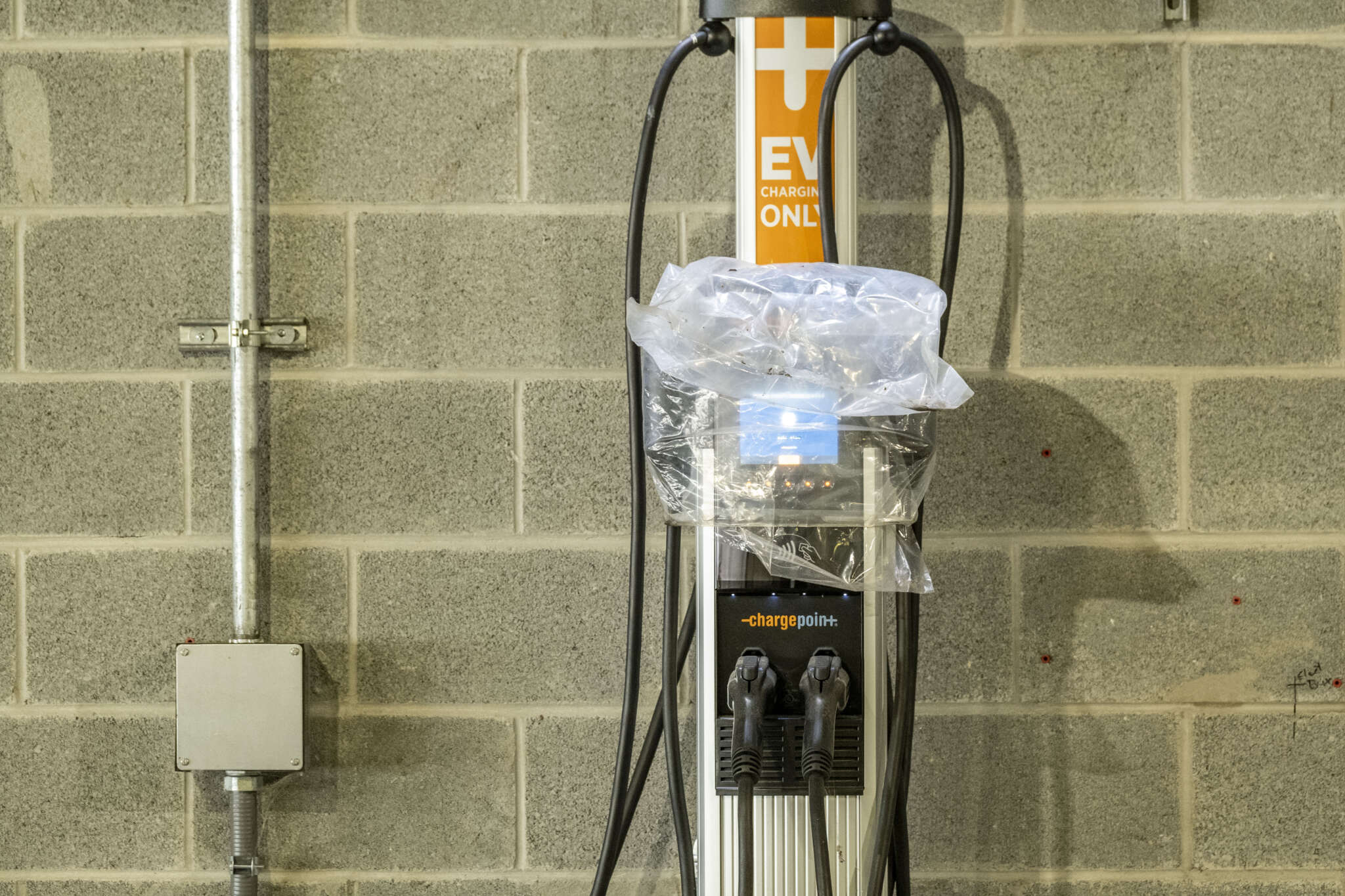
Fairfax County is ramping up its efforts to help homeowners’ associations and other resident groups bring electric vehicle chargers to their communities.
The county’s Office of Environmental and Energy Coordination is now accepting applications for the second phase of its Charge Up Fairfax pilot program, which provides technical and financial assistance to organizations looking to add charging stations in common areas.
“County staff and consultants will work with a new cohort of five common-interest (e.g. HOA) communities,” OEEC acting director John Morrill said in an Oct. 11 memo to the Board of Supervisors. “This second phase of the pilot will build upon initial participant feedback and lessons learned to bring more informed assistance to additional communities.”
The application window will be open through Nov. 12. In the memo, which was delivered to the board’s transportation committee yesterday (Tuesday), Morrill said his office hopes to launch the program at full scale next spring.
As the county pushes to expand Charge Up Fairfax, the HOAs selected for the pilot’s first phase in March are still working to get EV chargers into the ground.
Chosen out of nine applicants, including one that later withdrew from the process, the five communities were:
- Penderbrook Community Association
- Hidden Creek Homeowners Association near Burke
- Three Reston neighborhoods — Harpers Square Cluster Association, Nantucket at Reston and the Inlet Cluster Association
Prior to the pilot’s launch, Reston Association had anticipated starting installations as early as July, but as of September, none of the five participating groups have selected a contractor yet, Morrill said in the memo. Four are now discussing quotes from contractors with their boards.
“There are no further updates beyond what is documented in the memo,” OEEC spokesperson John Silcox said when asked if any progress has been made in the past month.
Though Charge Up Fairfax hasn’t resulted in any new EV chargers yet, the pilot has helped the county and HOAs learn more about the process and obstacles that residential neighborhoods face when trying to add that infrastructure.
The two top challenges that the HOAs have encountered so far are the cost of installing chargers and the limited availability of guest parking, since the stations have to be accessible to all residents and guests, Silcox told FFXnow.
Townhouse communities will soon be required to provide visitor parking in common areas after the Board of Supervisors approved new parking regulations last month that will take effect on Jan. 1.
The county is paying up to $10,000 for engineering site visits and feasibility assessments by its consultant, Vybe Energy, for each of the communities, which can also get grants to cover up to one-third, or $5,000, of their installation-related costs reimbursed. HOAs in highly vulnerable areas can get up to $10,000 reimbursed.
However, one of the HOAs has been “reexamining whether to move forward with community charging stations” or have residents install stations individually in their assigned spaces, the OEEC said. Another group is still determining how many stations it will install, and a third has put its project on hold after it had to shift funding to address “more pressing repair needs.”
In addition, two communities are working with county staff to potentially create more parking spaces that could be used for their EV chargers, according to the memo.
Despite those challenges, the OEEC says interest in Charge Up Fairfax has been strong, with 63 participants joining a Sept. 14 webinar and “dozens of individuals” signing up to receive updates.
When fully launched, the program is expected to support 15 communities annually. The county allocated $625,000 in its current fiscal year 2024 budget that will fund approximately two years of Charge Up Fairfax.
“Participants have also indicated that the program materials and the feasibility memo have been helpful with their decision-making and next steps,” Silcox said. “OEEC will continue to work closely with the pilot communities to learn what adjustments should be made to the program before it is launched more broadly in spring 2024.”
Electric buses have at last joined Northern Virginia’s largest local bus fleet.
Fairfax Connector launched the eight battery-powered vehicles out of its West Ox Operations and Maintenance Center (4970 Alliance Drive) at 10:30 a.m. last Thursday (Sept. 28), a critical first step forward in the transit system’s plan to phase out diesel or gas-fueled buses.
Supported by four newly installed, 150-kilowatt chargers with two dispensers each, the buses have 39 passenger seats and can travel up to 250 miles on a single charge, according to the Fairfax County Department of Transportation.
“Battery electric buses represent a monumental leap forward in eco-friendly transportation,” FCDOT said in a news release. “These vehicles offer a wide range of environmental benefits, including a drastic reduction in greenhouse gas emissions, a significant reduction in air and noise pollution, and decreased dependence on fossil fuels.”
Another eight electric buses are in the works as part of the new pilot program. Four vehicles currently in production will be delivered to the Huntington Bus Garage, while the other four haven’t started production yet and aren’t slated to arrive until 2025.
The initial eight buses will be deployed on six different routes, covering a wide swath of the county:
- 310: Franconia Road-Rolling Valley
- 395: Gambrill-Pentagon Express
- 901: Herndon Metro-Centreville
- 632: Westfields Blvd-Walney Road
- 463: Maple Avenue-Vienna
- 615: Fair Oaks-Greenbriar
The next eight buses will also be tested “on various routes in the coming months,” FCDOT communications head Freddy Serrano said.
The pilot is launching a little behind schedule. The county had previously hoped to have electric buses on the road by December 2022.
“Additional supply chain impacts caused by the pandemic delayed manufacturing,” Serrano said. “Also, a factory recall was issued and remedied before acceptance of the buses.”
Electric bus recalls sparked by a battery fire this spring also delayed deliveries to Metro, which is expecting 12 vehicles for the first phase of its transition plan and recently landed funds to help convert its Cinder Bed Road Bus Division garage in Franconia into a fully electric facility.
Fairfax County started exploring using electric vehicles for public transportation by piloting an autonomous Relay shuttle in Merrifield until this past June. The Department of Public Works and Environmental Services recently unveiled its first electric trash truck, and Fairfax County Public Schools has added a few electric school buses to its fleet.
While these are Fairfax Connector’s first electric buses, the agency already had several electric support vehicles, including 14 sedans and chargers at its Fair Oaks offices (4050 Legato Road) and two electric vehicles with six chargers at the Herndon Bus Garage (268 Spring Street).
“The pilot program includes several phases and is the first of many steps toward a more sustainable transit system in Fairfax County,” FCDOT transit services division chief and Fairfax Connector head Dwayne Pelfrey said. “Information obtained during the pilot program and on-going evaluation of various technologies will guide strategic decisions in the coming years as we work to build tomorrow’s transit system today.”
Pledging to become carbon-neutral by 2040, Fairfax County adopted an operational energy strategy in 2021 with goals that included halting all diesel bus purchases after this fiscal year — which ends June 30, 2024 — and fully transitioning all buses and fleet vehicles to electricity or a non-carbon-emitting power source by 2035.
Fairfax Connector has more than 300 buses that carry approximately 26,000 riders on 93 routes daily.
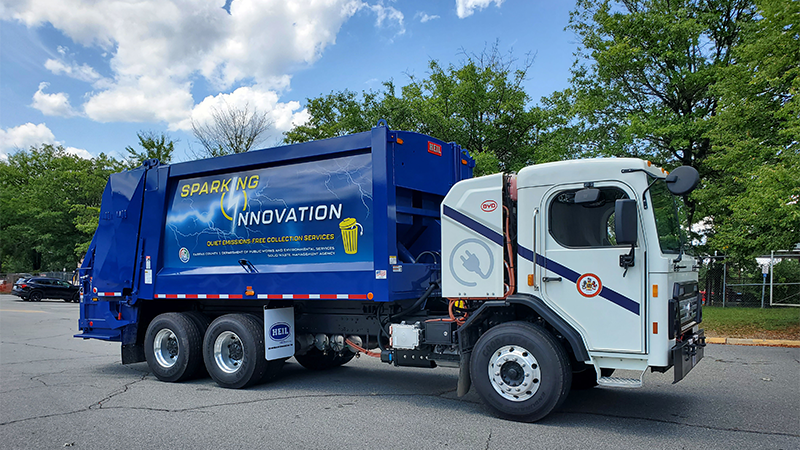
The Fairfax County Department of Public Works and Environmental Services (DPWES) is unveiling its first electric refuse trash truck today (Friday).
The truck will “pick up residential trash and yard waste on routes throughout the county,” DPWES announced. The county says the truck is “a move that will save money and protect the environment.”
The unveiling falls in line with the county’s strategy to make government operations carbon-neutral by 2040.
“Electric vehicles produce zero emissions, meaning cleaner air for Fairfax County. Electric vehicles are quieter, also reducing noise pollution. The electric truck saves residents money by requiring less overall maintenance and eliminating fuel costs,” the site reads.
The truck will join a fleet that already has 50 electric vehicles in operation, including four sedans used by DPWES. In addition, Fairfax County Public Schools has eight electric school buses.
Scott Peterson, vice chair of local environmental advocacy group Faith Alliance for Climate Solutions, called the new trash truck a positive first step.
“We hope the trial is successful and that electric trash trucks in the county, both private and county-owned, will quickly become the new normal,” Peterson said. “Heavy trucks running through our neighborhoods won’t be polluting the air we all breathe, and they’ll be so much quieter, too.”
Charging stations have been installed at the DPWES Newington Collections facility at 6901 Allen Park Road, where the county is holding the unveiling.
“When the battery has less than 20 percent of power, it will take up to five hours to recharge. Once it’s on its route, this truck can hold up to seven tons of recycling and up to 12 tons of trash,” the county says.
The trucks cost the county roughly $350,000 and are paid for by the Department’s Solid Waste Management Program and a Virginia Department of Environmental Quality grant. The county expects to have a second electric truck in September.
The unveiling is open to the public, and several county lawmakers are scheduled to speak. The event starts at 11 am.
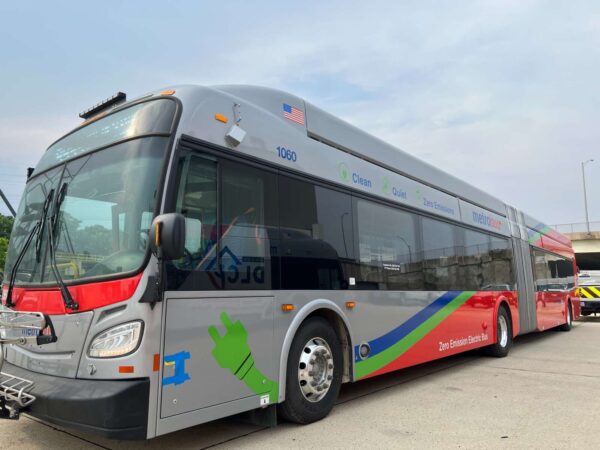
Metro’s bus facility in Franconia is a step closer to going electric, thanks to a big infusion of funding from the federal government.
The Federal Transit Administration has awarded Metro a $104 million grant to convert its Cinder Bed Road Bus Division garage at 7901 Cinder Bed Road into a fully electric facility, the Washington Metropolitan Area Transit Authority announced Monday (June 26).
In addition to supporting new charging infrastructure, the funds will enable Metro to buy about 100 battery-powered buses and develop a training program for drivers, mechanics and first responders, according to Sens. Mark Warner and Tim Kaine, who lauded the grant in a joint statement.
“We appreciate the Federal Transit Administration’s leadership in the transition to zero-emission bus technology that will help reduce air pollution and improve quality of life across the region,” WMATA Board Chair Paul Smedberg said, thanking the senators and other federal, state and local elected officials for helping secure the money.
Metro’s board of directors adopted a plan in 2021 directing the transit agency to purchase only buses that don’t produce carbon emissions by 2030 and fully transition to a zero-emission bus fleet by 2045.
Metro’s first electric bus arrived this month as part of an initial 12-vehicle batch that will operate out of the Shepherd Parkway garage in D.C., according to WMATA. The vehicles were expected earlier, but the delivery got delayed after a fire in Connecticut last summer forced the manufacturer New Flyer to recall hundreds of buses.
Located northeast of the I-95 and Fairfax County Parkway interchange, the Cinder Bed Road garage houses 121 40-foot buses that serve 11 routes, as of December 2021. It has parking for 160 vehicles and 13 maintenance bays.
According to Metro’s transition plan, the facility could host 112 battery-powered electric buses. It has “safe and efficient site circulation,” but a stacked bus parking layout and existing underground infrastructure for utilities and stormwater pose hurdles.
To fully cover the cost of converting the Cinder Bed garage, the federal grant will be matched by “a combination of local funding,” a Metro spokesperson said.
Fairfax County plans to use the facility for its future Richmond Highway bus rapid transit service. Branded as The One, the system will operate all-electric buses from Fort Belvoir to the Huntington Metro station, potentially beginning in 2030.
“Thanks to our partnership with the Washington Metropolitan Area Transit Authority and federal support, we will soon deliver a fully converted battery-electric bus facility in Fairfax County,” Fairfax County Board of Supervisors Chairman Jeff McKay said. “This project aligns with the county’s important goal of carbon neutral government operations by 2040 and is an investment in the region’s transit system and clean energy that will bring significant environmental and community benefits.”
The conversion design process is slated to begin later this year, with a projected opening coming in 2027-2028, according to WMATA’s transition plan. Read More
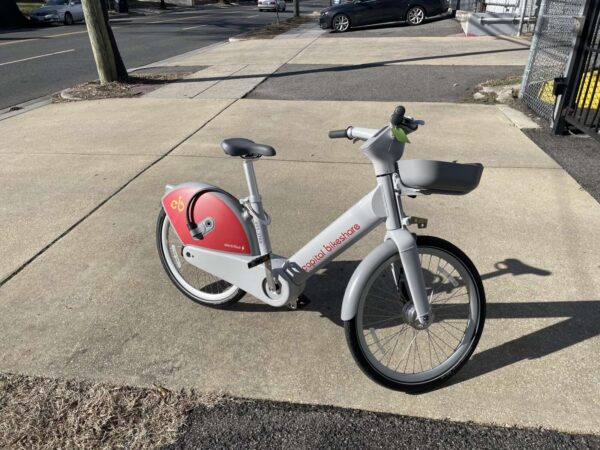
Electric bicycles with a brand-new look will dock at select Capital Bikeshare stations in Fairfax County this spring.
The rental bicycle-sharing service is rolling out 850 new e-bikes across the D.C. area, more than doubling its current stock and bringing its total fleet close to 7,000 bicycles, according to the Washington Post.
Initiated yesterday (Monday) and continuing through April, the rollout includes 45 e-bikes owned by Fairfax County, which will introduce them to five stations in Tysons, Reston and Dunn Loring:
- Tysons Metro North
- Dunn Loring Metro
- W&OD Trail/Sunset Hills Road & Isaac Newton Square
- Wiehle-Reston Metro South
- Reston Town Center Metro North
Manufactured by the ride-sharing company Lyft, the new e-bikes will be able to reach speeds of 20 mph with the electric assist, have longer-lasting batteries, provide better visibility with retroreflective paint, and eliminate the shift transmission on the older e-bikes, according to Capital Bikeshare.
The company intends to phase out the existing, black-painted model of e-bikes this August, the Fairfax County Department of Transportation previously said.
The county is working to expand its Bikeshare network with new stations in the Tysons, Franconia and Huntington areas in the works. Another 100 e-bikes will be ordered to support those stations this spring.
“In 2024 and beyond, Fairfax County plans to acquire approximately 200 additional e-bikes to support expansion around the Huntington and Innovation Metrorail Stations, Baileys Crossroads, Seven Corners, and Annandale,” FCDOT said in a news release.
While e-bikes are more expensive, the county has said the costs of the initial rollout will be covered by federal grant money and rider fees.
The bikes cost 10 cents per minute for annual Capital Bikeshare members, with a $2 fee for parking outside of a station. Non-members pay $1 to unlock the bike and 15 cents per minute. Members of the Capital Bikeshare for All program can ride e-bikes for free for up to 1 hour and don’t have to pay the $2 out-of-station fee.
The new model of e-bikes is also being added in D.C. and Arlington County.

